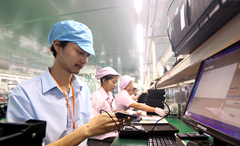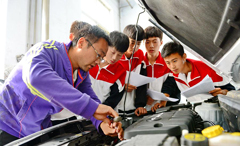Govt policy moves from the past week
2019-02-19
China Daily
Financial support for private business boosted
China will beef up financial support to private businesses with targeted monetary and credit policies, according to a guideline published on Feb 14.
The guideline, issued by the General Office of the Communist Party of China Central Committee and the General Office of the State Council, aims to provide an effective solution to the financing difficulties faced by private businesses, which include the high cost of funding.
It also seeks to increase the vitality of micro-sized enterprises and give play to the role of private businesses in promoting economic growth and creating jobs.
It also aims to give businesses equal access to financing services, irrespective of their ownerships structure.
Financial institutions will be encouraged to lend more money to private enterprises and small and micro-sized businesses, the guideline said.
Eligible private companies will be able to expand direct financing and be supported in the issuance of corporate bonds. Financial institutions should increase their investment in corporate bonds issued by private businesses, the guideline said.
Financial institutions will receive support to replenish their capital through the financial market, and banks will be encouraged to step up the settlement of nonperforming assets so that funds can be directed to private businesses.
The guideline also calls for the establishment of information service platforms. Credit agencies will be encouraged to offer credit products and services to private enterprises.
The government will actively foster angel investors and venture capital companies that invest in private companies pursuing technological innovation, the guideline said.
It also highlighted the importance of improving private enterprises’ access to financing. The proportion of corporate loans to private companies should be lifted, and private companies should not be discriminated against when applying for loans.
Plan urges training of more high-quality workers
The State Council has rolled out a plan to further reform vocational education in a bid to train more high-quality workers.
The country will push forward reform of vocational education and its training system to meet the development demands of a modern economy and enable better and higher-quality employment, the plan said.
The plan, published on Feb 13, has set the goal of diversifying the operations of China’s vocational education institutions, which are now mostly government-run, so that more nongovernment entities and personnel can participate in the next five to 10 years.
It also details measures to improve national systems and policies related to vocational education and lift the quality of both secondary and higher vocational education in the country.
A system of national standards for vocational education will be established and measures will be taken to ensure standards for teaching, education materials and teachers will be met.
Cooperation between vocational schools and enterprises will be promoted, and a number of high-level training bases will be established, according to the plan.
Enterprises will be encouraged to take a leading role in hosting vocational education, and large businesses will receive support to open high-quality institutions.
Poverty alleviation efforts to be intensified this year
China will make unrelenting efforts to ensure at least 10 million people are lifted out of poverty this year, according to a decision made at a State Council executive meeting on Feb 11.
The meeting, chaired by Premier Li Keqiang, said efforts to help extremely poor areas will be intensified this year.
A statement issued after the meeting said increased poverty alleviation funds from the central government budget will mainly be channeled to such areas, and the government will make the implementation of projects under the 13th Five-Year Plan that strengthen weak links in poor areas a priority.
The meeting also urged greater strides in cross-regional pairing arrangements for poverty alleviation and improvement of the quality of poverty alleviation efforts. The difficulties poor people face in meeting the essential needs of food, clothing, compulsory education, basic healthcare and a place to live will be tackled down to the level of every household, the statement said.


